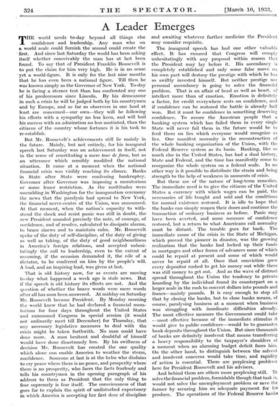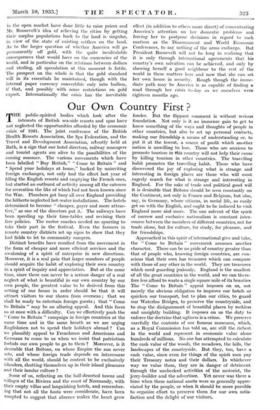A Leader Emerges
THE world needs to-day beyond all things else confidence and leadership. Any man who on a world scale could furnish the second could create the • first. And since last Saturday the world has been asking itself whether conceivably the man has at last been found. To say that of President Franklin Roosevelt is to put the claim for him very high. He is in no sense yet a world-figure. It is only for the last nine months that he has even been a national figure. Till then he was known simply as the Governor of New York. To-day he is facing a sterner test than has confronted any one of his predecessors since Lincoln. By his demeanour in such a crisis he will be judged both by his countrymen and by Europe, and so far as observers in one land at least are concerned—our own—they will be following his efforts with a sympathy no less keen, and will hail his success with an admiration no less unstinted, than the citizens of the country whose fortunes it is his task to re-establish.
But Mr. Roosevelt's achievements still lie mainly in the future. Mainly, but not entirely, for his inaugural speech last Saturday was an achievement in itself, not in the sense of constituting a mere tour de force, but as an utterance which sensibly modified the national situation. It came at a moment when the national financial crisis was visibly reaching its climax. Banks in State after State were confessing bankruptcy. Governor after Governor was imposing a moratorium or some lesser restriction. As the multitudes were assembling in Washington for the inauguration ceremony the news that the paralysis had spread to New York, the financial nerve-centre of the Union, was announced. At that moment, when the nation's capacity to with- stand the shock and resist panic was still in doubt, the new President sounded precisely the note, of courage, of confidence, and of resolve, calculated to dissipate alarms, to brace sinews and to maintain calm. Mr. Roosevelt spoke of the duty of self-discipline, of the duty of giving as well as taking, of the duty of good neighbourliness in America's foreign relations, and accepted unhesi- tatingly the call to leadership, even to the extent of assuming, if the occasion demanded it, the role of a dictator, to be conferred on him by the people's will. A lead, and an inspiring lead, was given at last.
That is old history now, for as events are moving to-day what happened a week ago is stale news. But if the speech is old history its effects are not. And the question of whether the brave words were mere words after all has soon been answered. At midday on Saturday Mr. Roosevelt became President. By Monday morning the world knew that he had declared a financial mora- torium for four days throughout the United States and summoned Congress in special session (it would not ordinarily meet till December) for Thursday, that any necessary legislative measures to deal with the crisis might be taken forthwith. No man could have done more. A man hesitant and doubtful of himself would have done disastrously less. By his swiftness of decision Mr. Roosevelt has created the one quality which alone can enable America to weather the storm, confidence. Someone at last is at the helm who disdains to cry peace where there is no peace, and prosperity where there is no prosperity, who faces the facts fearlessly and tells his countrymen in the opening paragraph of his address to them as President that the only thing to fear supremely is fear itself. The consciousness of that goes far to explain the spirit of undisturbed expectancy in which America is accepting her first dose of discipline and awaiting whatever further medicine the President may consider requisite.
The inaugural speech has had one other valuable effect. It has ensured that Congress will comply unhesitatingly with any proposal within reason that the President may lay before it. His ascendancy is completely established and only some false move on his own part will destroy the prestige with which he has so swiftly invested himself. But neither prestige nor personal ascendancy is going to solve the financial problem. That is an affair of head as well as heart, of intellect more than of emotion. Emotion is definitely a factor, for credit everywhere rests on confidence, and if confidence can be restored the battle is already half won. But it must be confidence in something deserving confidence. To assure the American people that a banking system which has failed them in every single State will never fail them in the future would be to feed them on lies which everyone would recognize as lies. One manifest necessity is the reconstruction of the whole banking organization of the Union, with the Federal Reserve system as its basis. Banking, like so much else in the United States, has had a dual history, State and Federal, and the time has manifestly come to reorganize the whole system on a federal scale. In no other way is it possible to distribute the strain and bring strength to the help of weakness in moments of crisis.
But these are of the nature of long-term remedies. The immediate need is to give the citizens of the United States a currency with which wages can be paid, the necessaries of life bought and sold and the conditions for normal existence restored. It is idle to hope that the banks can simply reopen their doors and continue the transaction of ordinary business as before. Panic may have been averted, and some measure of confidence restored, but a return to what Americans call normalcy must be distant. The trouble goes far back. The immediate cause of the crisis in the State of Michigan, which proved the pioneer in disaster, was the growing realization that the banks had locked up their funds in mortgages and other forms of advances none of which could be repaid at present and some of which would never be repaid at all. Once that conviction grew every depositor rushed to get his money out while there was still money to get out. And as the wave of distrust spread throughout the Union the tendency to private hoarding by the individual found its counterpart on a larger scale in the rush to convert dollars into pounds and francs—mainly pounds. It is easy enough to stop all that by closing the banks, but to close banks means, of course, paralysing business at a moment when business was struggling with inordinate difficulties already. The most effective measure the Government could take —most effective because of the immediate stimulus it would give to public confidence—would be to guarantee bank deposits throughout the Union. But since thousands of banks are definitely insolvent that means transferring a heavy responsibility to the taxpayer's shoulders at a moment when an alarming budget deficit faces him, On the other hand, to distinguish between the solvent and insolvent concerns would take time, and rapidity of action is essential. There are perplexing problems here for President Roosevelt and his advisers.
And behind them are others more perplexing still. To solve the financial problem, formidable though that task is, would not solve the unemployment problem or save the farmer by securing him an adequate payment for his produce. The operations of the Federal Reserve banks in the open market have done little to raise prices and Mr. Roosevelt's idea of relieving the cities by getting their surplus populations back to the land is singular, in view of the state of existing settlers on the land. As to the larger question of whether America will go permanently off gold, with the quite incalculable consequences that would have on the currencies of the world, and in particular on the relations between dollars and sterling, all speculation at this moment is futile. The prospect on the whole is that the gold standard will in its essentials be maintained, though with the internal paper currency convertible only into bullion, if that, and possibly with some restrictions on gold export. Internationally the crisis has the inevitable effect (in addition to others more direct) of concentrating America's attention on her domestic problems and forcing her to postpone decisions in regard to such matters as the Disarmament and World Economic Conferences, to say nothing of the arms embargo. But President Roosevelt will not be long in realizing that it is only through international agreements that his country's own salvation can be achieved, and only by showing herself a good neighbour to the rest of the world in these matters here and now that she can set her own house in security. Rough though the imme- diate path may be America is as capable of finding a road through her crisis to-day as we ourselves were eighteen months ago.







































 Previous page
Previous page